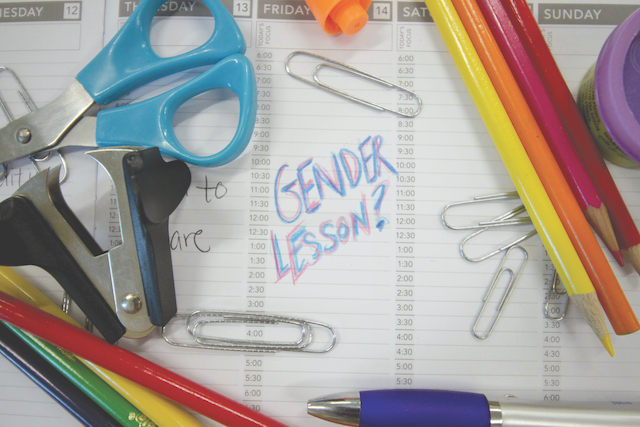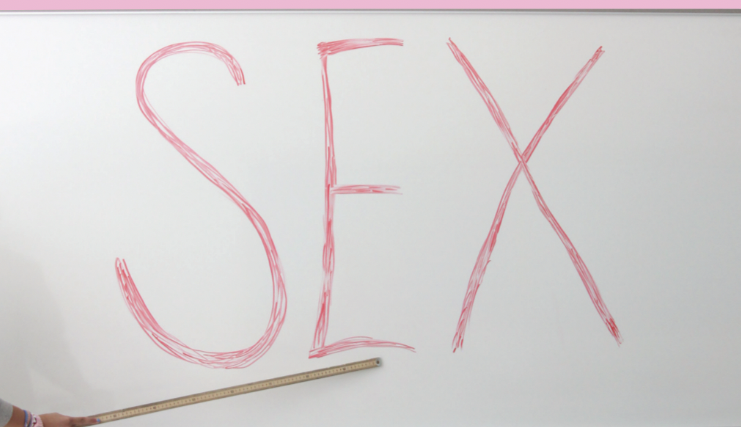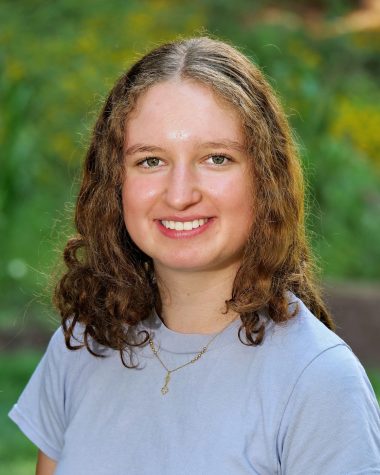Background
As part of its DEIJ (Diversity Equity Inclusion Justice) curriculum, the Lower School began teaching gender inclusion lessons in 2020, which have garnered a wide range of parent reactions, from support to concern. Just as the rest of the country is grappling with these issues, the CESJDS community has differing opinions on how these topics should be approached with students of different ages.
At the Lower School, these lessons occur once a year for 30-45 minutes, aiming to combat gender stereotypes and give students the necessary tools and language for acceptance and inclusion, according to Dr. Kimberly Sherk, the Lower School Language Arts, Social Studies and DEIJ Coordinator. Each grade has its own materials and learning objectives.
“It’s all about making sure wherever a child is in their identity, that they feel welcome, and giving anybody’s classmates the opportunity to know how to approach each other when there are questions when anything is brought up,” Sherk said. “If somebody says ‘you can’t play with us because you’re a girl,’ how do you respond to that?”
The Washington Post found that lesson plans for gender identity are becoming more common and that seven states require curriculums to include LGBTQ topics. However, they also reported that five states limit how teachers can discuss gender identity. Closer to home, Moco360 reported protests in June of hundreds of parents in light of Montgomery County Public School’s (MCPS) no-opt-out policy of LGBTQ+ inclusive storybooks in schools.
Lower School Principal Bellas said that the decision to cover gender inclusion in the curriculum was not driven by any local or national trend.
“It’s good to know that we’re a school that is part of a national conversation, that we’re doing something that is educationally relevant,” Bellas said. “The conversation in and of itself is not impacting what or how we do things.”
Bellas said that in the early spring of 2020, the Upper School began rolling out new initiatives to acknowledge gender identity, and Lower School families began sharing that their children were on gender journeys, so he wanted to ensure that those students would feel comfortable and safe by developing lessons and reviewing the curriculums.
Sherk explained that the lessons were developed using research from educational research journals, the Anti-Defamation League and Learning for Justice, and they are refined every year.
Pushback
Some parents have expressed concern about JDS teaching these topics. Some believe that the lessons are not age appropriate and that the school uses them to push an ideology, a claim the school denies.
On Feb. 27, Bellas and Head of School Rabbi Malkus received a letter from a group of parents that explained they understand the school’s goal to create an inclusive atmosphere, yet question the particular approach. For that reason, the group of parents wrote, “we are uncomfortable with the Lower School’s planned lessons about gender identity and, for varying reasons, do not consent to our young children attending those lessons.”
Twenty-six Lower School families, three Upper School families and 10 individuals from the wider community signed the letter, according to Bellas. An anonymous parent who was part of this cohort said, “it’s unfortunately a bit of a challenge to confirm or deny Rabbi Bellas’s breakdown,” but thinks it is an undercount. For fear of ostracization and social consequences for themselves and their children, many parents have remained anonymous with these concerns, so the letter could not be circulated around to grade-wide WhatsApp chats, for example, and many people were likely unaware that this letter existed.
“In the letter, everyone’s on board with creating an inclusive community,” the anonymous parent said. “No one should be made to feel like an outsider. It’s a question of approach [and] age appropriateness of some of this stuff. Whether there’s a way to do it that doesn’t adopt a particular ideology; like can’t we teach kids to be nice to one another without teaching them that.”
The anonymous parent also explained that the lessons take place in April, which is Acts of Loving Kindness Month at the Lower School, so children could be taught other lessons instead, such as zero tolerance for bullying.
Bellas and Malkus responded in an email to the parents, explaining that gender inclusion lessons are necessary for creating a safe and inclusive community and preventing bullying.
“Gender diverse children/youth who are not affirmed have significantly higher rates of suicide and depression than gender typical kids,” Bellas and Malkus wrote in their response to the group of parents.
Just like parents, students also have diverse opinions on teaching elementary-aged children these subjects. Junior Sam Verschleisser is transgender and said that the lessons would have been helpful to him when he was in elementary school.
“This education…is definitely going to help kids feel safer and feel more okay expressing themselves genuinely,” Verschleisser said.
On the other hand, another high school student explained that they appreciated the school being accepting, but did not think it was the school’s place to teach these lessons. That student was also unwilling to share their name for fear of being ostracized.
“I’m really surprised that JDS, an institution that caters to families across the political spectrum, would take such definitive strides in one direction as opposed to the other,” the student said. “I’m equally surprised that they would subject young impressionable children to lessons that are practically engineered to confuse them, and which I believe are simply not age appropriate.”
Materials
Another concern of the signatories of the letter was the materials used in the lessons. The materials vary each year as new research comes out, Sherk explained, so when the school alerted parents in the middle of February that they were introducing the video “A Boy Like Me” to first grade, an assortment of parents expressed concerns over the video’s one-sided generalizations of gender, and some claim it inappropriately introduces the idea that gender is a “feeling in your heart.”
Bellas said that the video was reviewed by himself, Assistant Principal Rebecca Prigal, Malkus and the guidance team, who all agreed that the content was appropriate and wanted to try using a video instead of the book “Dolls and Trucks Are for Everyone” by Robb Pearlman.
“There is no non-ideological reason that I can come up with for getting rid of that book in favor of a lesson that explicitly introduced the concept of gender dysphoria to six and seven-year-olds,” the anonymous parent said.
According to the DSM-5-TR, gender dysphoria is “clinically significant distress or impairment related to gender incongruence, which may include desire to change primary and/or secondary sex characteristics.” However, Malkus said that only older students are introduced to terminology relating to gender dysphoria.
After receiving additional feedback from several other parents about the video’s one-sided generalizations of gender, Bellas removed the video from the planned lessons because he did not want parents to opt out of the lessons due to this video. The anonymous parent believes the administration heard parents’ concerns about generalizations of gender in the video and thus removed it from the curriculum. However, the parent did not feel like the administration recognized parents’ concerns about exposing students to the concept of gender dysphoria.
“In terms of determining what’s in the curriculum and what isn’t, that’s up to us as the professional educators to decide,” Bellas said.
Bellas clarified that the school is open to feedback from the community about the curriculum, but parents do not have a final say in deciding what is in the curriculum.
Additionally, while the anonymous parent supports the school’s effort in combating gender stereotypes, they said that the lessons become questionable as the grade levels rise.
“There’s an internal illogic to it … As they get older, [there is an] idea that if a boy likes pink, he might be trans,” the anonymous parent said. “It’s like fighting these stereotypes, and then at a certain point, it’s a 180 and really embraces the stereotypes in a certain way.”
Despite these objections, many parents support these lessons and the materials used. Brian Liss, the vice president of the CESJDS Board of Directors, is one of them.
“As a parent, I am confident that the school knows what it’s doing as far as how to educate our students,” Liss said. “I put my faith in the school and confidence that … the curriculum is appropriate for the age and reflects our schools’ core values.”
Accommodations
Bellas and Malkus also explained in their letter that parents can choose to opt out of these lessons, but the school would not offer alternative programming, just as they would not for other parts of the curriculum. In previous years, the school sent students whose parents chose to opt-out of these lessons to Wonders Learning, an aftercare program that works with the Lower School, but the school did not offer any alternative to the programming this past year. This year, the school scheduled the lessons at the beginning or end of the school day to make it easier for families to opt out of them.
However, some parents are frustrated with this response because they feel that the school is taking a non-accommodating approach by inconveniencing parents to pick their kids up from school early or taking them to school late rather than allowing students to sit in the media center.
Sherk explained that one of the reasons alternative learning is not offered is staffing issues. In addition, Bellas pointed out that the school provides advanced notice to families that these lessons are approaching.
However, the anonymous parent said that by informing parents that these lessons are coming, the school is sending a message that these lessons are actually treated separately from other parts of the curriculum, which means the school should provide accommodations. Thus, the parent said, that by not providing accommodations, JDS is not being pluralistic.
“I would hope that a school with pluralism as its core value [would have an] approach to this issue [that] would reflect that core value and [not] just pick and choose which core values they’re actually going to hold by or value at any given time,” the anonymous parent said.
Bellas said that Lower School leadership debated over giving advance notice to parents for these lessons but ultimately agreed that informing parents would be the most pluralistic and inclusive approach.
Parent diversity committee
Furthermore, in their letter, Bellas and Malkus shared that they organized a parent diversity committee to educate families about the school’s engagement in DEIJ.
The committee aims to educate and discuss the school’s DEIJ initiatives in hopes of having a conversation with and aligning the larger community with the educators, according to Liss, one of two co-chairs of the committee. He said that Sherk spoke with the committee about the overall gender curriculum and considered parent feedback.
“Parents who attended engaged in a respectful and worthwhile discussion of both what is taught and their perspectives on these issues,” Malkus and Bellas wrote.
The committee is composed of about 16 members who applied and were selected by Malkus to reflect the demographic, religious and political diversity of the school.
“For the most part, the community is 100% supportive of the school’s efforts in these areas and in the way we educate our students about diversity,” Liss said. “There are some questions about how specifically to educate in that area, and we had a good discussion about it.”
However, some parents believe that the committee does not reflect the diversity of the parent body, especially for sensitive topics such as gender inclusion.
“We always know that we’re not going to make everybody happy,” Bellas said. “No
matter what it is that we do in the school, and the gender inclusion lesson is just one example of that. We’re not going to have 100% acceptance and satisfaction with anything that we do, and there’s always things that can be improved.”
Moving forward
Bellas hopes that every parent feels comfortable sharing their concerns and said that these conversations would be more productive if they were face-to-face. He is disappointed that parents feel that they will be ostracized for sharing their opinions.
“We’re blessed to be a large community Jewish Day School, and that means we’re going to have a lot of people with a lot of different opinions, and if we’re truly going to be pluralistic and diverse, that means that every opinion matters,” Bellas said.
He also emphasized that parents should feel heard when giving feedback to the school. The anonymous parent felt that the Lower School leadership took their letter seriously but was doubtful about its impact. The parent hopes that, at the least, the school reconsiders accommodations for parents that opt out of these lessons.
“I think you get a letter from the parents, and you kind of have to read it respectfully,” the parent said. “I don’t think it has any impact whatsoever on their decision-making.”
Since these lessons are contained to once per year, the anonymous parent said they will keep their children at CESJDS for now. However, they would consider leaving the school if these lessons were expanded.
“If it were something where I felt like my child was actually starting to get confused by some of these ideas and starting to question their own gender, we’d be out of school in a heartbeat,” the parent said.
All children need the language to have conversations about these topics, according to Sherk, and the lessons are designed to teach kids to be good humans. Bellas agreed that these lessons are necessary, especially to prevent bullying.
“That one lesson that teaches about gender stereotyping, being warm and welcoming, and not making judgments about other people and, when the students are older, informing them about appropriate gender identity vocabulary, that’s not going to open the door to a child to think that their gender identity is something that’s confusing or a decision that they have to make at some point in their lives,” Bellas said.
In their letter to the school, the group of parents explained that they understand the diverse perspective about including gender inclusivity in the curriculum but believe that the school must take a more pluralistic approach in both the lessons and their accommodations.
“The school has sent a troubling signal about its lack of commitment to inclusivity by refusing to hear our perspective and denying any accommodations whatsoever to families who want to explore other ways of teaching Acts of Loving Kindness,” the parents wrote.
Malkus said that these lessons embrace how students view themselves and are connected to the Jewish values of seeing every student as created in God’s image.
“I don’t view anything that we’re doing as controversial,” Malkus said. “I’m aware that outside of the school, these issues have been politicized, but inside the school, we’re acting as educators, promoting our school’s core values and trying to make sure that kids treat each other respectfully and are welcoming.”
Correction:
In the 41n1 “All Eyes On Identity” article, we referred to the Lower School’s “DEIJ curriculum” in the first paragraph. Lower School Principal Rabbi Bellas and Head of School Rabbi Malkus responded in an email: “Lessons on gender identity are not part of a DEIJ curriculum; they are one lesson in the scope and sequence of counseling lessons taught by our school counselors over the course of a year, which are all focused on community building and social-emotional learning and development.”
Also, we wrote, “In previous years, the school sent students whose parents chose to opt-out of these lessons to Wonders Learning.” Bellas and Malkus wrote: “By using the word “years,” a reader may be led to believe that Wonders was a planned offering of alternate programming over the course of multiple years. Neither of these are true.”
See comments for full email.









The Lion's Tale • Oct 12, 2023 at 12:14 pm
Dear Lena,
Thank you for all of the time and effort you and the Lion’s Tale team put into the production of the All Eyes on Identity article in The Lion’s Tale – you did a wonderful job. I felt it presented different views of the conversation on the topic and was very thorough. There are two specific factual points that I believe are important to clarify and correct and Rabbi Malkus and I would appreciate the printing of a correction in the next edition:
1. At the very beginning of the article, you wrote about the Lower School’s “DEIJ curriculum.” As we discussed in our interview, DEIJ is a lens through which curriculum is viewed and reflected upon; it is not a curriculum in and of itself for the school. Lessons on gender identity are not part of a DEIJ curriculum; they are one lesson in the scope and sequence of counselling lessons taught by our school counsellors over the course of a year, which are all focused on community building and social-emotional learning and development. We do not want the community to think mistakenly that we have developed a DEIJ curriculum in the same way as we have a math or social studies or TaNaKH curriculum. When we think about DEIJ and curriculum, it helps us to make sure we are including diverse voices, being equitable and inclusive, and reflecting the values of pluralism, v’ahavta l’rei-a-kha, and b’tzelem Elokim in our teaching and learning.
2. In the Accommodations section, you wrote the following “In previous years, the school sent students whose parents chose to opt-out of these lessons to Wonders Learning.” By using the word “years,” a reader may be led to believe that Wonders was a planned offering of alternate programming over the course of multiple years. Neither of these are true. When the lessons were taught in the spring of 2022, we followed a similar notification process to families with an email from the counsellors that we used last year. However, a shorter period of advance notice was given and the lessons took place throughout the school day, when it was convenient for the counsellors and teachers’ teaching schedules. When some families wrote back with concerns and asked that their children not participate, Rabbi Malkus and I decided to create an alternative with Wonders since it may have been difficult for families to pick up their children in the middle of the school day and on shorter notice. This arrangement was a response to families and occurred only the one time in the spring of 2022. We changed our approach going into the 2023 lessons to provide several weeks’ notice and to schedule the lessons only at the beginning or end of the school day to make it more convenient for families who wanted to opt out to drop off later of pick up early. There are no other places where the School offers supervision when a family chooses to opt out and we are not able to offer it in this situation either.
Thank you again for the article and for considering our points of correction and feedback.
L’shalom,
Rabbi Malkus and Rabbi Bellas